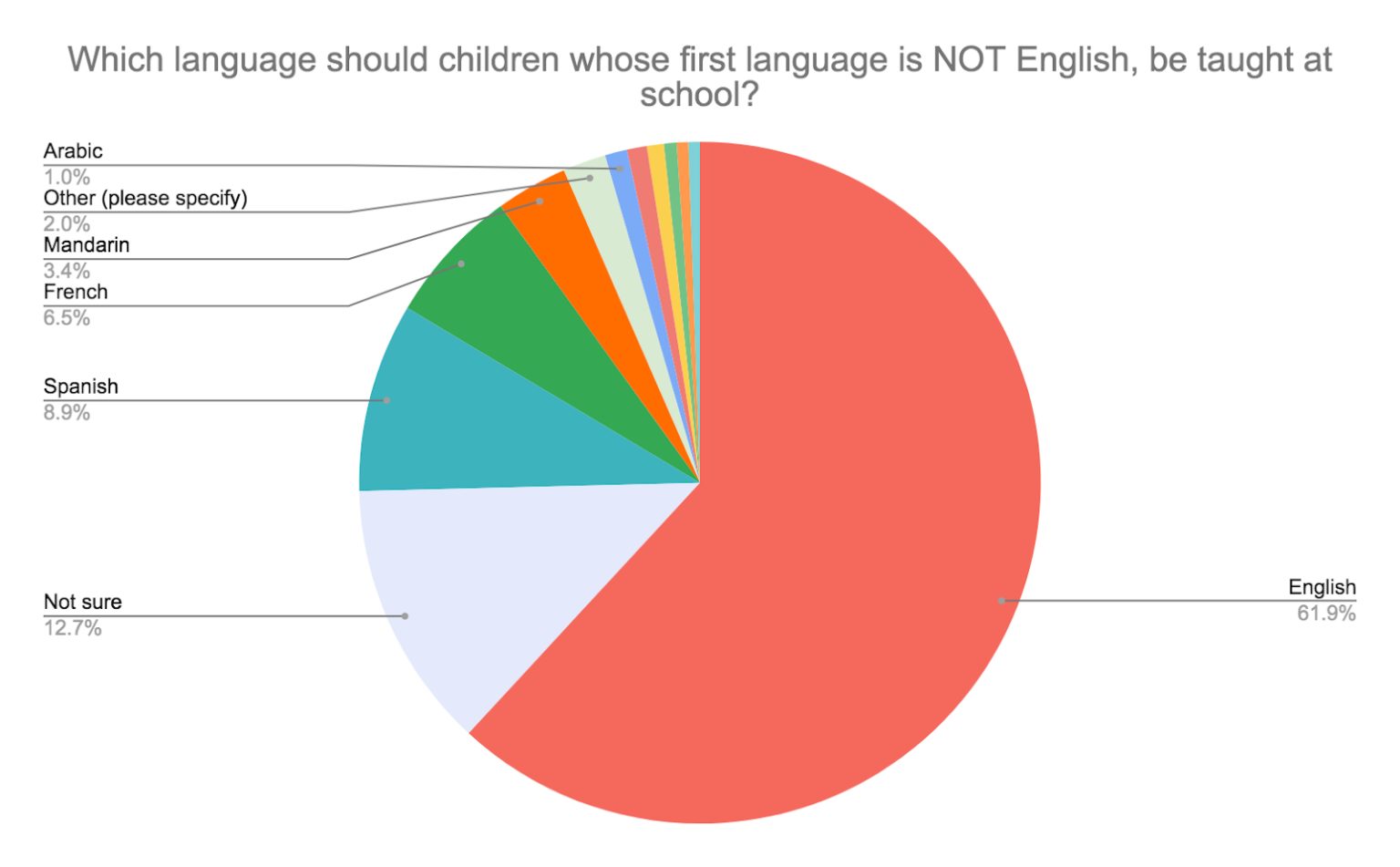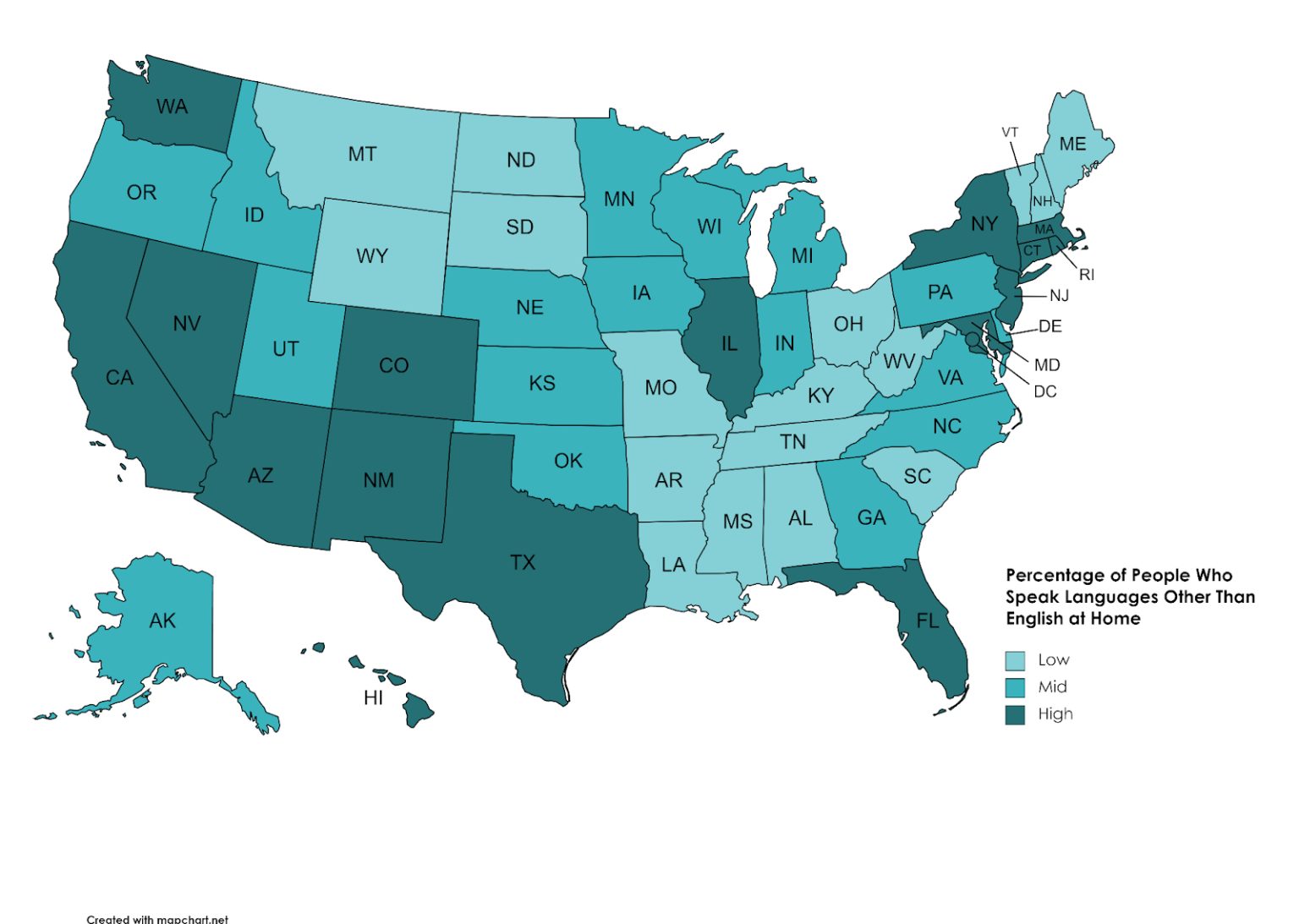Recent studies indicate that English is presently used by approximately 1.35 billion individuals globally, constituting around 17% of the world’s population. However, it remains a question when children across the world commence their English language education and how much significance this widely spoken language holds in 2022.
To uncover comprehensive insights into the English language, we conducted a survey involving 2,000 respondents, analyzed over 4.3 million online searches, and thoroughly reviewed the latest research on the subject.
What is your English level?
Find out your A1 A2 B1 B2 C1 C2 level of English with our quick, free online test.
Summary of Global English Language Statistics
- The United Arab Emirates stands out as the country with the greatest enthusiasm for learning English, as evidenced by a higher volume of searches for terms like ‘Learn English’ and ‘Translate to English’ compared to any other nation globally.
- Among all US states, California boasts the highest percentage of households where a language other than English is spoken.
- In the UK, 62% of adults believe that English holds the utmost importance as a language for non-native children to learn in schools worldwide.
- With official status in 75 different countries across the globe, English is recognized as an official language in nearly 39% of all nations.
- Children across the globe typically commence their English language education at the age of seven and a half, on average.
Which Countries Want to Learn English Most?
Considering that English serves as the language of science, innovation, business, and the internet, it’s no wonder that a considerable number of people worldwide aspire to acquire it. However, which countries currently display the greatest enthusiasm for learning the English language?
To uncover this information, we conducted an analysis of more than 4.3 million online searches conducted in the top 100 most populous countries in 2022. Our examination specifically focused on searches conducted for the phrases ‘learn English’ and ‘translate to English,’ revealing the following findings:
- The United Arab Emirates ranks highest in terms of the desire to learn English, with a notably higher proportion of searches compared to any other country. Over the past year, an average of 34,800 searches were performed for the term ‘learn English,’ along with a remarkable 1.1 million searches for ‘translate to English’ in the UAE.
- Malaysia also demonstrates a strong inclination toward learning English, with 23 searches for ‘learn English’ per 10,000 of the population and an additional 801 searches per 10,000 for ‘translate to English’ conducted over the last year.
- Other countries exhibiting a substantial interest in searches related to English language learning include the Philippines, Sweden, and Israel.
| Rank | Country | Average yearly searches for ‘learn English‘ per 10,000 people |
| 1. | United Arab Emirates | 35 |
| 2. | Malaysia | 23 |
| 3. | Sweden | 20 |
| 4. | Israel | 18 |
| 5. | Saudi Arabia | 18 |
| 6. | Canada | 17 |
| 7. | Morocco | 17 |
| 8. | Colombia | 15 |
| 9. | Australia | 15 |
| 10. | United Kingdom | 14 |
Nations with the Most Prevalent Search Activity for the Phrase ‘Learn English’. Information derived from the online search analysis tool Keyword Finder as of February 2022.
| Rank | Country | Average yearly searches for ‘translate to English‘ per 10,000 people |
| 1. | United Arab Emirates | 1,140 |
| 2. | Philippines | 930 |
| 3. | Malaysia | 801 |
| 4. | Australia | 494 |
| 5. | United Kingdom | 490 |
| 6. | Azerbaijan | 473 |
| 7. | Sri Lanka | 345 |
| 8. | Canada | 334 |
| 9. | Saudi Arabia | 281 |
| 10. | United States | 273 |
Countries with the Greatest Share of Searches for the Phrase ‘Translate to English’. Information extracted from the online search analysis tool Keyword Finder as of February 2022.
Are you C1 Advanced English?
Get your C1 Advanced English certificate now!
✓ Add your certificate to your resume
⭐ ⭐ ⭐ ⭐ ⭐
At What Age Do Children Start to Learn English at School Around the World?
Our earlier discoveries suggest that alongside those currently engaged in learning English, a substantial number have aspirations to do so, whether through language courses, online tutoring, or interactive apps. Moreover, in addition to adults aiming to acquire English, many non-native speakers acquire the language during their school years.
Information gathered from a research study conducted at the University of Winnipeg in Canada has allowed us to generate the following map depicting the ages at which students in various countries worldwide commence their English language education in schools.

As evident, English is an obligatory component in the educational programs of numerous countries worldwide, with 138 nations incorporating it into their core curriculum. In contrast, 40 other countries offer students the choice to opt for English as an elective course if they desire.
Various linguistic scholars over time have observed that the earlier we initiate language learning, the greater the likelihood of achieving proficiency. This phenomenon is commonly known as the critical period hypothesis, and certain studies have indicated that acquiring a language after the age of 10 can substantially reduce the likelihood of attaining complete fluency.

However, which nations around the world introduce English education to children at the earliest stage, and which ones postpone it until after this crucial period?
Based on our examination of data from the University of Winnipeg’s research, we discovered that in the subsequent 23 countries where English is not the primary language, English instruction becomes mandatory starting at the age of 4:
- Antigua and Barbuda
- Armenia
- Bahamas
- Barbados
- Belize
- Brunei
- Dominica
- Ecuador
- Ghana
- Grenada
- Guyana
- Jamaica
- Malta
- Marshall Islands
- Mauritania
- Mexico
- Monaco
- Netherlands
- Panama
- Singapore
- Spain
- Saint Vincent and the Grenadines
- Trinidad and Tobago
However the following countries start teaching English as a mandatory subject from the age of 12+:
- Benin (12)
- Burkina Faso (12)
- Cambodia (12)
- Central African Republic (12)
- Congo, Democratic Republic of the (12)
- Congo, Republic of the (12)
- Cote d’Ivoire (12)
- Timor-Leste (12)
- El Salvador (12)
- Gabon (12)
- Haiti (12)
- Indonesia (12)
- Mali (12)
- Mozambique (12)
- Nicaragua (12)
- Niger (12)
- Switzerland (12)
- Togo (12)
- Venezuela (12)
- Yemen (12)
- Luxembourg (14)
- Costa Rica (15)
- Iceland (15)
And the following 5 countries only provide English as an optional subject which can be taken by children over the age of 12:
- Angola
- Cape Verde
- Chad
- Guinea
- Senegal
Perspectives on the English Language as We Approach
It’s evident that different nations across the globe hold diverse perspectives regarding the significance of early English language education. However, what are the sentiments of individuals residing in the United Kingdom regarding this matter?
To ascertain this, we conducted a survey of 2,000 adults in the UK on October 20, 2021, in collaboration with the market research firm Censuswide, posing the following question:
“For children worldwide whose native language is NOT English, which language do you believe is of utmost importance for them to be taught in school?”

Survey findings indicate the following:
– 62% of UK adults consider English to be the most crucial language for non-native children’s education in schools.
– 9% of respondents prioritize Spanish as the most significant language for non-English-speaking children to learn at school.
– Approximately 6.5% of participants believe that children not native to English should receive instruction in French at school.
– Other language preferences include Mandarin (3.4%), Arabic (1%), Hindi (0.9%), Russian (0.8%), Indonesian (0.6%), Bengali (0.55%), and Portuguese (0.55%).
How Many Countries Have English as an Official Language?
– The number of countries where English is designated as an official language is a key piece of information. It’s noteworthy to consider when children globally commence their English education and the perspectives of individuals in the UK regarding the importance of the English language. But which nations actually include English in their list of official languages? And what does it mean for a language to be deemed official in a country?
– To clarify, an official language in a country is defined as follows: “The language or one of the languages that is officially recognized and accepted by a country’s government, used in educational institutions, legal proceedings, and more.”
– Our research findings indicate that English holds the status of an official language by legal designation (known as de jure) in 55 countries worldwide. This accounts for approximately 28.5% of the world’s total nations.
– When we expand our scope to include countries where English is treated as an official language in practice or de facto (not officially recognized by law), the tally increases to 75 countries. This means that English serves as one of the official languages in approximately 39% of the world’s countries.
– Additionally, there are specific regions within different countries that officially acknowledge English as a language of importance. These regions encompass Hong Kong (China), Curaçao, Sint Maarten, Saba, and Sint Eustatius (The Netherlands), San Andrés and Providencia (Colombia), as well as the autonomous regions of the North and South Caribbean coasts in Nicaragua.

Which US States Have the Highest Rate of People Who Don’t Speak English at Home
– Data from the U.S. Census Bureau indicates that 1 out of every 5 individuals in the United States possesses bilingual abilities, while the predominant majority of American adults consider English their primary language.
– Despite English’s prevailing status as the primary language across most of the United States, our curiosity led us to explore which states exhibit the highest percentage of residents who communicate in languages other than English within their households.
– Our analysis of U.S. Census data unveiled the following insights:
– In California, approximately 44% of residents converse in languages other than English at home.
– Texas ranks second in terms of the proportion of individuals using languages other than English at home, with 35.5% reporting this practice.
– New Mexico also boasts a significant percentage of people (34%) who communicate in languages other than English within their homes.

The states with the lowest percentage of people who speak a language other than English at home are West Virginia, Mississippi and Montana where figures stand at just 2.6%, 4% and 4.2% respectively.
Facts and figures about the English language
– After delving into its global popularity, the countries most eager to learn it, the age at which non-native speakers typically start their English education, and people’s perceptions of the language in 2022, there’s still much more to uncover about English!
– Were you aware that English holds the distinction of being the third most prevalent first language across the globe, with over 527 million individuals speaking it as their native tongue?
– English stands as the most widely studied language by non-native speakers on a global scale, and some experts project that the language will be spoken by a staggering 2 billion people by the year 2050!
– Intriguingly, research has determined that the English language ranks among the happiest languages in existence, sharing this distinction with Spanish and Portuguese!
What is your English level?
Find out your A1 A2 B1 B2 C1 C2 level of English with our quick, free online test.





